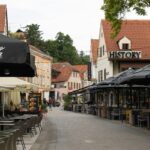May 11, 2020 — Croatia opened its border to all EU residents who own property or boats in the country, anyone with urgent family matters and anyone with “business” to attend to, even if that business is tourism. Well… sort of.
It also downgraded the strict 14-day quarantine. All new entries must now submit to a gentle request to keep a safe distance and pleasant isolation when not conducting business.
Croatian citizens are also now free to come and go as they please.
Croatia’s National Public Health Committee on May 9 amended existing border regulations and created loopholes seemingly large enough for the entire tourism industry to pass through. Yet when asked if the new rules apply to tourists, the Interior Minister offered the verbal equivalent of a shoulder shrug and suggested emailing the border police.
Foreigners hoping to enter Croatia must provide proof they either: own real estate or a vessel in Croatia; are attending a funeral; or have been invited to the country by some business entity to conduct economic activity, according to Jutarnji List.
The final rule spread confusion as the tourism industry and potential guests hope to rekindle the summer season. Could tourists arrive if their accommodations provider “invited” them to engage in business and economic activity?
The Civil Protection Directorate’s head and Interior Minister Davor Božinović stumbled when clarifying the rules in an interview. He demurred from assuring anyone entry, suggesting ambiguous situations will be judged on a case-by-case basis.
If a tourist, for example, applies to enter Croatia today, Božinović said the Interior Ministry would consider it, if the arrangement complies with epidemiological measures. He did not specify what documents a tourist needs to provide, nor what “complying with epidemiological measures” means in such a scenario.
Those who enter can avoid self-isolation measures. Sometimes.
“People are allowed to go to a business meeting, do what they came for, to go to their real estate,” he said. “But the time after they do what they came for should be spent where they are accommodated, whether it’s a hotel or a dormitory.”
In other words: entry isn’t guaranteed. But people are welcome to check with the Interior Ministry before packing a suitcase.
Božinović said the Border Administration created an e-mail address where foreigners can ask if they meet the conditions for entry into Croatia. The authorities created a special email address to answer questions about border crossings: uzg.covid@mup.hr.
Those who consider their aging parent an “urgent family matter,” beware. “Visits to families are not recommended,” he said. “Of course, if it is a death, we will accommodate it.”
Visitors shouldn’t expect a mandatory 14-day quarantine when they arrive but should minimize contact with the wider world.
“It makes no sense if you have a meeting and invite people who are interested in business cooperation and put them in isolation and cannot leave the hotel,” Božinović said.
Those entering Croatia should, however, remain separated if they begin showing signs of illness.
The Directorate’s official decision offers a hard-to-follow, poorly structured explanation of who can and cannot enter the country. It allows entry for EU citizens or residents or long-term visas in the EU to enter for “business or economic reasons” though it does not define those terms. Those with “urgent personal reasons” will also be allowed.
“People are allowed to go to a business meeting, do what they came for, to go to their real estate or college, but the time after they do what they came for should be spent where they are accommodated, whether it is a hotel or student dormitory,” Božinović said.
The change in procedure comes as Croatia is reportedly engaged in bilateral talks with neighbors seeking some epidemiologically sound methods to open the borders for the summer tourism season. But Brussels and EU heads of states may chafe at member states negotiating bilateral border agreements, especially with a non-Schengen member like Croatia. The European Union is also preparing a set of measures to guide the tourism industry’s slow reinstation.
The minister added the new rules immediately sparked 200 applications to enter the country.







